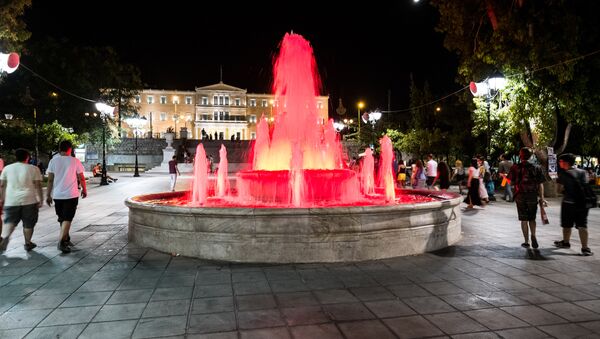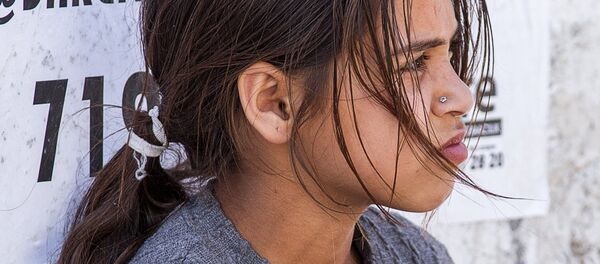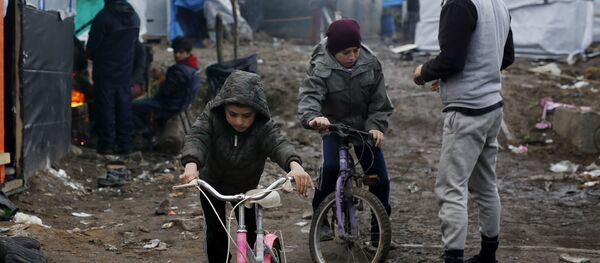Unaccompanied minors, in an attempt to survive on the streets of Athens in Greece, are caught up in prostitution and drugs. The money they earn is being used to pay traffickers to get them to central Europe.
A young teenage boy, known as Ali (not his real name), from Afghanistan has come to Europe hoping to gain an education and eventually send for his mother.
Féroz Haidari, 15, from Ghazni, Afghanistan, is one of hundreds of unaccompanied minors currently stranded in Greece. pic.twitter.com/4sMYrWnoxL
— Fahrinisa (@Fahrinisa) 26 October 2016
But now Ali is completely dependent on drugs and the money he gets from clients. Memories of seeing his mother again become a distant dream.
"Some will take you home, give you clothes and anything you like," Ali said in a recent interview.
"They will treat you like their husband, their boyfriend, they will give you $212, $318, $425. It's very hard. How can a person be with another man like that? Those men are sick. No matter how often I do it, it doesn't get easier," Ali said.
We visited refugee camps in Greece. We call on EU Member States to speed up relocation. Women & unaccompanied minors must be protected now! pic.twitter.com/tVhOr6ww2E
— S&D Group (@TheProgressives) 4 November 2016
The issue of unaccompanied minors traveling from war-torn countries to Europe is not a new one. Hundreds of young children have traveled alone to Europe and have tried to enter Britain in illegal and dangerous ways. In April 2016, the UK had agreed to take in more child refugees in the Dubs Amendment, passed by Lord Alf Dubs, committing the British government to taking in unaccompanied child refugees. Under international law, a child is defined as someone younger than 18 years of age.
The UK government has already taken in 300 children from Calais, 50 of them from Eritrea. However, there are still many more minors traveling alone and subjected to harm and abuse. In many cases this leads to an increase in unaccompanied minors getting involved in sex and illegal drug trade industries.
In addition to this, the March 2016 'one-for one' deal between the EU and Turkey (in which Turkey would accept back migrants who crossed its borders into Greece, while the EU would resettle refugees directly from Turkey) froze, leaving tens of thousands stranded in Greece.
The Greek government said around 1,200 unaccompanied minors in Greece are among those still waiting for shelter. However, many refugees have not registered with local authorities out of fear of being sent back.
Lora Pappa, founding member and president of METAdrasi, an NGO in Greece that focuses on migration and development, said that Greece simply doesn't have enough space to help all the young refugees and that the international community needs to do more.
"Firstly we don't know how many unaccompanied children there are, as there are so many. After the border was closed the minors were trapped in Greece. In Greece we have approx 2,500 minors and 800 of them are in centers, the rest are in camps, detention and streets. The unaccompanied minors' shelters capacity in Greece has been increased from 200 to 1,000, which is a huge step. It's impossible to have hundreds of shelters in such a short time to accommodate all the minors that need help, we do not have enough space. All EU member states should share the responsibility for unaccompanied minors," President Lora Pappa told Sputnik.
"The second problem is that there's a plan to transfer all minors who are not in shelters to camps. We are against this plan as already the conditions in camps are not appropriate at all for children and it's winter," Ms. Pappa told Sputnik.
Beneath the snow refugee camp #Olympus #Greece; #Refugees in process of removing; among 240 refugees living in the camp,about 80 children! pic.twitter.com/aDeXqM69fJ
— Christos G Failadis (@xfailadis) December 1, 2016
She believes that the international community should do more, however it is the bureaucracy that is holding Europe back from pushing forward with plans to accept more minors.
"I don't think that the rest of Europe is doing enough to help minors, there is too much bureaucracy and it is used to not find a solution. We have to be more flexible in Europe. There are decisions that are not respected by some EU members," Ms. Pappa told Sputnik.
@metadrasi "Alternatives to relocation for unaccompanied children are needed.Many are excluded because of the nationality criteria"#easocf16
— SabrinaLn (@SabriinaLn) November 29, 2016
@metadrasi "They live in undignified conditions, in camps which are not even safe for adults."#easocf16
— SabrinaLn (@SabriinaLn) November 29, 2016
"The UK has a problem with accepting unaccompanied minors, due to bureaucracy and this is bad. They should work with local NGOs. We have a case in Greece where the Greek healthcare system is not able to provide medical support for one young boy with specific medical needs and who meets all the criteria to be relocated to the UK. He will die if not helped," Ms. Pappa added.
The refugee crisis is a serious issue, with so many people fleeing war and putting themselves in danger trying to reach Europe.
It is placing huge strain on countries such as Greece and Italy who have had to take in majority of migrants arriving in the EU. However, with so many children traveling alone, the need for the rest of Europe to help out is a pressing one.
The risk that unaccompanied minors are facing is increasing and this will only stop once they are placed in safe housing. However, bureaucracy and red tape are becoming the obstacles that campaigners find increasingly difficult to overcome.




